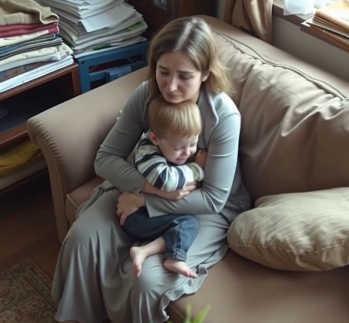
She sat down next to him and began to whisper in a low, conspiratorial tone. My son’s face immediately tensed, his eyes darting to the door, hoping perhaps that I would miraculously appear. It was a heartbreaking sight, seeing him so distressed.
I strained to hear what she was saying, but the words were muffled. However, her tone was unmistakably severe and demanding. My heart sank as I realized this was more than just forgetfulness or fatigue — something was seriously wrong. I quietly slid out of the closet, my mind racing with what to do next.
After my mother left the room to make tea, I approached my son cautiously, not wanting to startle him. His little body was curled in on itself, as if trying to shield himself from the world. Sitting down beside him, I whispered, “It’s okay, sweetheart. I’m here.”
He looked up, his eyes wide with relief and fear. “She says the shadows are coming, and they’ll take me away if I’m not quiet,” he confessed in a voice barely above a whisper. My heart broke further, realizing the extent of his fear.
I hugged him tightly, assuring him that there were no shadows and that he was safe with me. My mind was racing, trying to process the situation. I couldn’t let this go on. I knew I had to confront my mother, but more importantly, I needed to understand why this was happening.
Later that evening, after settling my son with a movie and his favorite blanket, I sat down with my mother. Her usually warm and caring demeanor was now clouded with a strange detachment. I gently broached the subject, trying to make sense of her actions.
“Mom, has anything been troubling you lately?” I asked, trying to keep my voice steady.
She looked at me, and for the first time, I noticed how tired and worn out she seemed. “I…I don’t know,” she stammered. “Sometimes I feel like I’m not myself.”
Her admission was both a relief and a concern. It was clear something was affecting her mentally, perhaps more seriously than I had ever thought. I suggested we visit a doctor together, reassuring her that it was just to talk, to understand what was happening. She reluctantly agreed, perhaps sensing that she needed help.
Over the next few days, I made arrangements for my son to stay with a trusted neighbor while I was at work. I also took my mother to see a neurologist, hoping to get to the bottom of her behavior. The diagnosis, when it came, was both shocking and a relief: early onset dementia. It explained her forgetfulness and the episodes with my son.
Armed with this knowledge, we began the journey of arranging care and support for my mother. It was a difficult time, navigating the complexities of her condition while trying to ensure my son felt safe and loved. But the relief in knowing what we were dealing with made all the difference.
In the end, we found a new rhythm in our lives. My mother, with the right treatment and support, became more stable, and my son, reassured of his safety, began to smile and play without fear once more. It was a challenging chapter, but we emerged from it stronger and more connected than ever.





